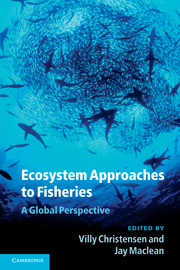Book contents
- Frontmatter
- Contents
- List of contributors
- Foreword
- Preface
- Acknowledgments
- 1 Introduction: toward ecosystem-based management of fisheries
- I Life in the oceans
- II Evaluating impact on marine life
- III Managing living resources
- IV The human side
- 13 Science and capacity building for sustainable development in fisheries
- 14 Thinking big on small-scale fisheries
- 15 Coastal-marine resource use in human ecological context: the scale and modes of integration
- 16 Global fisheries economic analysis
- V Impacting policy
- Index
- References
16 - Global fisheries economic analysis
Published online by Cambridge University Press: 05 June 2012
- Frontmatter
- Contents
- List of contributors
- Foreword
- Preface
- Acknowledgments
- 1 Introduction: toward ecosystem-based management of fisheries
- I Life in the oceans
- II Evaluating impact on marine life
- III Managing living resources
- IV The human side
- 13 Science and capacity building for sustainable development in fisheries
- 14 Thinking big on small-scale fisheries
- 15 Coastal-marine resource use in human ecological context: the scale and modes of integration
- 16 Global fisheries economic analysis
- V Impacting policy
- Index
- References
Summary
INTRODUCTION
The starting point for global fisheries economics work in the Sea Around Us project at the University of British Columbia Fisheries Centre is the creation of global databases. Over the last few years, we have created and/or compiled global databases on ex-vessel fish prices, subsidies, recreational fisheries, social discount rates, and consumer price indices. We are currently developing two additional global databases: cost of fishing and fisheries employment. This information, combined with other project databases, provides remarkable opportunities for conducting global-scale fisheries analyses.
This chapter summarizes the results reported by Sumaila et al. (2010), which provide estimates of global fisheries subsidies; and Cisneros-Montemayor and Sumaila (2010) and Dyck and Sumaila (2010), which estimate the contribution of ecosystem-based marine recreation and ocean fish populations to the global economy, respectively.
FISHERIES SUBSIDIES WORLDWIDE
Fisheries subsidies are defined as financial transfers, direct or indirect, from public entities to the fishing sector, which help the sector make more profit than it would otherwise (Sumaila et al., 2008). Such transfers are often designed to either reduce the costs of production or increase revenues. In addition, they may also include indirect payments that benefit fishers, such as management and decommissioning programs.
Subsidies have gained worldwide attention because of their complex relationship with trade, ecological sustainability, and socioeconomic development. It is widely acknowledged that global fisheries are overcapitalized, resulting in the depletion of fishery resources (Hatcher and Robinson, 1999; Munro and Sumaila, 2002).
- Type
- Chapter
- Information
- Ecosystem Approaches to FisheriesA Global Perspective, pp. 272 - 280Publisher: Cambridge University PressPrint publication year: 2011



